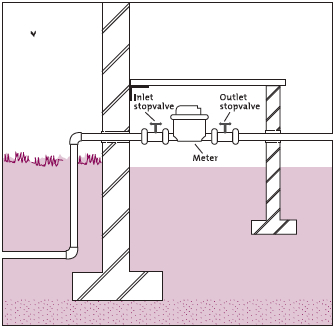Domestic connection / Pipelines
When enough water and funds are available, the best option is to connect every house or yard to a piped water system. This is more convenient for water users, generally increases water use, and improves hygiene. A service pipe, usually made of PE or PVCu, leads from the distribution network to the house or yard.
The domestic connection can consist of a single tap on a post, or a system of pipes and taps in a house. A gate valve and a water meter are normally installed at the entry to the premises. Drainage must also be provided. The residual head of water (pressure) at household connections should be 10–30 m.
Users per connection: Usually, one family.
Yield: Depends on the pressure of the public main, diameter of the household connection, and demand.
Costs
Initial cost: Depends on factors, such as whether the domestic connection extends into a house, the type of piping material used, whether PE or PVCu pipes are available locally, etc.

